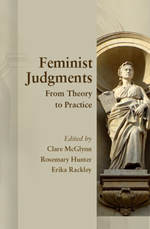In recent years in the UK there has been considerable debate and policy development on the issue of judicial diversity. Questions have been asked about the possible impact of more women judges and, in particular, how the introduction of women's lived experience and feminist theoretical perspectives might affect the development of the common law and the interpretation of key statutes.
The Feminist Judgments Project represents a timely, dynamic and innovative next step in this debate. The Project is a unique, imaginative collaboration in which a group of feminist socio-legal scholars have written alternative feminist judgments in significant English legal cases. Rather than simply critiquing existing judgments, the participants have engaged in a practical, 'real world' exercise of judgment-writing, subject to the various constraints that bind appellate judges, including consideration of the extent to which, and the form in which, a judge's political commitments and social experience may or may not be introduced into her decision-making. The project aimed to inaugurate a new form of critical socio-legal scholarship, one which seeks to demonstrate in a sustained and disciplined way how judgments could have been written and cases could have been decided differently.
Reading the judgments ought to be a chastening experience for any judge who believes himself or herself to be both true to their judicial oath and a neutral observer of the world
The project was discussed in a recent Guardian article:
Rackley, E. How feminism could improve judicial decision-making The Guardian Thursday 11 November 2010
The feminist judgments have been published in an edited collection, Feminist Judgments: From Theory to Practice. Each judgment is preceded by a commentary written by a different author. The commentaries introduce the case for the non-specialist reader, explaining its significance and placing it in its legal and policy context. The collection also includes a comprehensive introduction drawing out the common themes from the judgments and policy implications of the project, and two methodological papers concerning the writing of feminist judgments. The book was published by Hart Publishing in September 2010.
An end-of-project conference is planned in May 2011 where the judgments and their implications will be discussed.
